
*
Brian d'Arcy James famously played the ogre Shrek in the eponymous Broadway musical, and nowadays he's playing a bit of an ogre in Giant, the Michael John LaChiusa-Sybille Pearson musical at the Public Theater that's based on the 1952 Edna Ferber novel, which was made into a classic 1956 Hollywood movie and follows a Texas cattle family through a quarter of the 20th century.
James, 44, is Jordan "Bick" Benedict, the cattleman proprietor of the enormous Reata ranch, the Rock Hudson role in the film; Kate Baldwin is his wealthy Virginia wife, Leslie Lynnton Benedict (Elizabeth Taylor in the film); PJ Griffith (American Idiot) is Jett Rink, the ranch worker who becomes an oil magnate — James Dean's last film role. The cast includes Michele Pawk, John Dossett and Bobby Steggert. Steggert portrays Bick and Leslie's son, Jordy Jr., who marries a Mexican woman and teaches a lesson in fighting bigotry. Composer-lyricist LaChiusa is a Tony nominee for The Wild Party, Marie Christine and Chronicle of Death Foretold; librettist Pearson got a Tony nomination for Baby. Giant's director, Michael Greif, is best known for Rent, Next to Normal and Grey Gardens.
James got a Tony nomination for Shrek the Musical in 2009 and for his performance as the heartless and amoral New York City press agent Sidney Falco in the musical Sweet Smell of Success in 2002. His other credits include Time Stands Still, the Pulitzer Prize-winning Next to Normal, The Apple Tree, The Lieutenant of Inishmore and Dirty Rotten Scoundrels — and his role on the much-discussed TV series "Smash" last season as Debra Messing's much-cheated-upon schoolteacher husband. We recently chatted with James about Giant (which is at the Public through Dec. 2), his past and his future, and about "Smash."
Would you tell me about "Bick" Benedict — how you see the character, from when we first meet him to how he changes over the decades?
| |
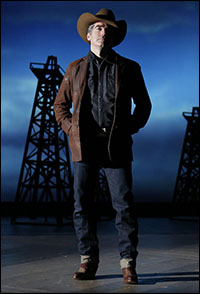 |
|
| James in Giant. | ||
| photo by Joan Marcus |
There is a change in him. He's slow to change. But he is capable of changing.
What about Leslie's point of view causes Bick to change?
BDJ: One of the biggest changes is in terms of human rights, of how she sees the Mexican workers on his ranch and how he views them. Although he has the attitude of being a proponent of their livelihood and treating them with great care and respect, he sees them primarily as workers. He doesn't see that he doesn't give them ample living arrangements.
Leslie is there to shine the light on those kinds of things — the disparity between how the Mexican workers are treated as opposed to those who aren't Mexicans. The haves and the have-nots, if you will. She's there to constantly remind him and say, look at the disparity, look at the inequality here, and let's do something about it. That's a very potent and very important theme in the show.
But on the smaller scale there is the family life and the basic relationship the parents have with the children. In this case Bick favoring his daughter because she embraces his ideals and ideas more readily than does his son, Jordy. So there's a great family drama going on.
For me, the show has a lot to do with the idea of what we pass on from generation to generation, what a parent gives to a child. How that is a representation of the evolution of this country, in the way that ideas change and the way that ideas are embraced or not. That's what I think is really beautiful about Giant.
| |
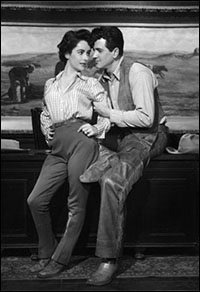 |
|
| Elizabeth Taylor and Rock Hudson in "Giant." | ||
| 1955 Warner Brothers |
BDJ: I have.
Did the movie, and seeing Rock Hudson's performance, influence you in any way in your portrayal of Bick?
BDJ: Not necessarily. It helped me in an informative way, in terms of seeing one version of a visual representation of this book, which is so beautifully written by Ferber and so detailed in its description of character and place. The movie was helpful in giving me one context of how these people operated in this world. But Sybille Pearson and Michael John LaChiusa have — much like the screenplay was independent of the novel, so too is this version of Giant. It has its own life.
So I think there are three different viable options of Giant. If you have a voracious appetite for "Giant," you can have three different versions, and ours is unique unto itself. There are lots of things that exist in our show that don't exist in the novel or the movie. And similarly, the movie dreamed up some scenes to paint characters in a particular way. And I think that all are fair and good. What I like about our show is that it has its own life and it has its own backbone as well.
So the musical is different from the book as well as being different from the movie?
BDJ: The book is definitely the key and is the template, but just like the screenplay took some detours in order to satisfy its own trajectory, so too did Sybille and Michael John, to shore up the ideas they have about these characters and the themes they want to highlight. You definitely can recognize it, it comes from Ferber's novel, but there are nuances and things that exist in our musical that are born out of the novel.
| |
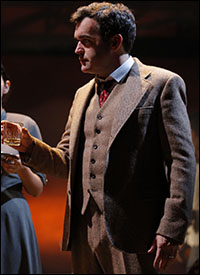 |
|
| James in Giant. | ||
| photo by Joan Marcus |
BDJ: The short answer is that it's the same, in that the challenges and the job are the same, in that you're given a score and words to look at and memorize and you have to chart a course to figure out how to do it and what's going to be best for you technically. But what I will say about Michael John's music is that attention must be paid, because they're not typical three-chord songs — which I'm a big fan of; I'm a pop music fan. My taste is in that world, and Michael John's music has that flavor, but the way it is written, for me, requires a little bit more attention to figure out what his intentions are and to honor those and just to be aware of how the songs are structured. I still find things in the songs, either lyrically or structurally, that make me think, Aha! I see what he's doing now.
I think he's a brilliant composer, and his melodies in this musical are just gorgeous and stunning and breathtaking. If I may add to that comment, Bruce Coughlin's work in the orchestrations only adds fuel to that fire. What's happening with the orchestra is just incredibly beautiful.
| |
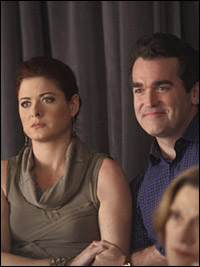 |
|
| Brian d'Arcy James, with Debra Messing, on "Smash." | ||
| Photo by Eric Liebowitz/NBC |
BDJ: As an actor, it was a thrill. Because I've been working quite a long time in this business, and I've had opportunities to work in TV and film, but I'd never had a network television series before. Just in the sense of getting that job, and the fact that it was shot in New York City, and the potential consistency of that work.
And then the fact that it was this world that I knew so well. It was a representation of the way I've spent my life in New York City, and before that, as an actor. It gave me a special pride. And working with all of the actors, all these people that came from so many different angles of the business — it made for a really eclectic and exciting group of people.
Chances are it won't happen again for me, unless I get lucky and get another television show that has to do with the making of a Broadway musical. Which isn't in the offing very soon.
You didn't get a chance to sing very much, though.
BDJ: That's true, but my character was a teacher, and there was a decision made very early on that not everybody should be from that [Broadway] world, just for the sake of not overwhelming the audience, or even stretching the boundaries of believability. At one point Frank was possibly somehow going to be tangentially involved in the theatre, and then they decided, I think wisely, to create a character that was independent of that world.
How did you find out you would no longer be a regular character in Season 2?
BDJ: I found out the typical way, through my agent. They just decided, I believe, that they needed to take different avenues and try new things to see if they could tell their story in a just as interesting if not more interesting way. You never want to lose a job, especially a job like this, but ultimately it's not a big surprise because actors are always at the mercy of a show closing or any number of other reasons why a job ends. Actors have a particular resiliency in these kinds of situations because our jobs don't last forever anyway and we're always looking for the next thing. So on we go.
I understand you're on this season's opener [NBC, Feb. 5] . Can you tell me anything about that?
BDJ: I don't want to spoil anything but I guess what I will say is that Frank is given a chance to, in a way, have a response, reach a particular point in his road where he makes a decision about how he feels things are going. I think it's probably obvious what I'm alluding to based on what happened between Frank and his wife. But how that happens I'll leave as a surprise.
| |
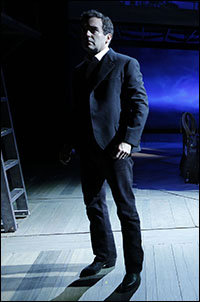 |
|
| James in Giant. | ||
| Photo by Joan Marcus |
BDJ: I grew up in Saginaw, Michigan. I love the fact that I'm working at the Public Theater right now because that fits in with why I do what I do. My sister, Anne, when she was younger, I think on her 13th birthday, came to New York to visit my aunt and uncle and they took her to see The Pirates of Penzance in Central Park [presented by the Public Theater], with Rex Smith and Kevin Kline and Linda Ronstadt. And she fell in love with the theatre and it changed her life. She is now a theatre administrator at New Trier [Township] High School in Winnetka, Illinois. She's really good at her job and passionate, an important teacher there.
By virtue of her experience, I absorbed that. She started doing high school theatre, and just by being two years younger than her and always following her around, that's how I became involved in theatre. I've always said I give her credit and I blame her for why I do what I do. So the fact that I'm working at the Public now is a full circle moment for me.
What really put the nail in the coffin was in college when I started studying theatre at Northwestern University and decided that was in fact what I was going to spend my life doing, or at least pursuing.
Is there some role you'd love to play that you haven't had a chance to?
BDJ: It seems a little sacrilegious perhaps or a little audacious of me to even say it because of what Tracy Letts is doing now [as George] in Who's Afraid of Virginia Woolf?, but that is a role that someday I would love to be able to tackle. Because I love the play. Something about it speaks to me. I love the combat of it and the nature of that play. Maybe someday I'll have a chance to take my crack at it.
I've got a lot of things in the fire that I'm doing for myself creatively. I have a television show I'm trying to sell called "Shiny People," about my experience working in industrials, or corporate theatre, and the bizarre clash of art and commerce in that medium. I've got things that are incubating and hopefully will have a chance to live. What do you have coming after Giant?
BDJ: I'm doing a one-man concert at Town Hall next May. [Other than that] I don't know. I'm looking at the fiscal cliff.
View highlights from the Public Theater production of Giant.










